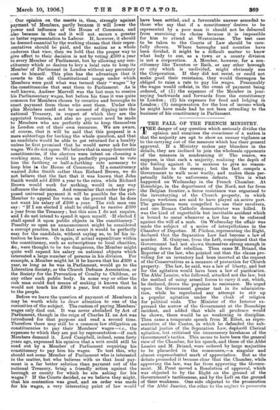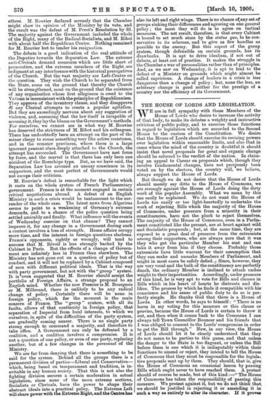THE FALL OF THE FRENCH MINISTRY. T HE danger of any
question which seriously divides the opinion and exercises the conscience of a nation is that the majority are apt to show an uneasy vigilance as to the carrying out of the measure which has their general approval. If a Ministry makes any blunders in the details, they are inclined to join the wholesale opponents of the measure in ,condemning it The reason, we suppose, is that such a. majority, realising the depth of the feeling against it, is anxious to give no reason- able handle to the enemy ; but the fact compels a Government to walk most warily, and makes them per- petually liable to unforeseen defeats. This is what happened on Wednesday in the French Chamber. At Boeschepe, in the department of the Nord, not far from the Belgian frontier, a fierce resistance was organised to the inventorying of the Church property, in which foreign workmen are said to have played an active part. The gendarmes were compelled to use their revolvers, and one Roman Catholic demonstrator was killed. It was the kind of regrettable but inevitable accident which is bound to occur whenever a law has to be enforced against the will of a mob. On Wednesday the affair was made the subject of a series of interpellations in the Chamber of Deputies. M. Plichon, representing the Right, declared that the Separation Law had become a law of murder. M. Guieysse, from the Left, complained that the Government had not shown themselves strong enough in putting down flat rebellion. Then came M. Briand, the Reporter of the law, who pointed out that the clause pro- viding for an inventory had been inserted at the request of the Conservatives as a measure of protection for Church property. The law, he said, was a law of liberty, and but for the agitation would have been a law of pacification. The Abbe Lemire, who followed, attacked not the law, but the method of using armed forces to carry it out, which, he declared, drove the populace to resistance. He urged upon the Government greater tact in its admiuistra- tion, while he reprobated any attempt to stir up a popular agitation under the cloak of religion for political ends. The Minister of the Interior ex- pressed the sorrow of the Government at the Boeschepe incident, and added that while all prudence would be shown, there would be no weakening in discipline. Then came a temperate speech from M. Ribot, as repre- sentative of the Centre, in which he defended the sub- stantial justice of the Separation Law, deplored Clerical agitation, but criticised the unnecessary harshness of the Government's tactics. This seems to have been the general view of the Chamber, for his speech, and those of the Abbe Lemire and M. Briand, were ordered by large majorities to be placarded in the communes,—a singular and almost unprecedented mark of appreciation. But as the debate proceeded it became clear that the Charaber, while approving the law, was far from approving the Govern- ment. M. Perot moved a Resolutiou of approval, which was objected to by the Right on the ground of the Government's tactlessness, and by the Left on the ground of their weakness. One side objected to the prosecution of the Abbe. Jauvier, the other to the neglect to prosecute, others. M. Rouvier declared serenely that the Chamber might show its opinion of the Ministry by its vote and the result was the defeat of M. Peret's Resolution by 33. The majority against the Government included the whole of the Right, many of the Radical-Socialists, and M. Ribot with about half the Republican Centre. Nothing remained for M. Bouvier but to tender his resignation.
The debate is a good indication of the real attitude of the Deputies towards the Separation Law. The extreme anti-Clericals demand measures which are little short of persecution, and the extreme members of the Right are indignant at any interference with the historical prerogatives of the Church. But the vast majority are Left-Centre on the question. They wish the Church to be separated from the State, some on the ground that thereby the Church will be strengthened, most on the ground that the existence of any organisation whose first allegiance is owed to the Vatican is inconsistent with the principles of Republicanism. They approve of the inventory clause, and they disapprove df any Clerical attempts to create a popular agitation. But they are exceedingly nervous about any suggestion of violence, and, assuming that the law itself is incapable of arousing it, they lay the blame on the Government's methods. For• ourselves, we cannot see in what way M. Rouvier has deserved the strictures of M. Ribot and his colleagues. There has undoubtedly been an attempt on the part of the minor clergy to rouse something very like active resistance, and in the remoter provinces, where there is a large ignorant peasant class.deeply attached to the Church, the attempt has succeeded. The Government have met force by force, and the marvel is that there has only been one accident of the Boeschepe type. But, as we have said, the Separation Law has aroused an uneasy conscience in its supporters, and the most perfect of Governments would not escape their criticism.
M. Rouvier's defeat is remarkable for the light which it casts on the whole system of French Parliamentary government. France is at the moment engaged in certain critical negotiations abroad. A defeat of an English Ministry in such a crisis would be tantamount to the sur- render of the whole case. The latest news from Algeciras seems to point to a weakening of Germany's extreme demands, and to a chance of the police question being settled amicably and finally. What influence will the events of Wednesday exercise on that chance? They cannot improve it, for any change in a Government during such a contest involves a loss of strength. Home affairs occupy more time, and the interest in foreign questions slackens. France's opponents, rightly or wrongly, will tend to assume that M. Revoil is less strongly backed. by the Cabinet in Paris. But the effects of a change of Govern- ment are infinitely less in France than elsewhere. The Ministry has not gone out on a question of policy but of conduct, and it will not be replaced by a Cabinet composed of men with different political ideals. That is the way with party government, but not with the" group" system. It is*even suggested that M. Rouvier should accept the portfolio of Foreign Affairs, a strange proposal to an English mind. Whether the new Premier is M. Bourgeois or M. Millerand, there is unlikely to be any radical change of policy. Certainly there will be none in foreign policy, . which for the moment is the main concern of France. The " group " system, with all its faults, allows of that continuity in foreign policy, that separation of Imperial from local interests, to which we ourselves, in spite of the difficulties of the party system, are gradually coming nearer. There is no single party strong enough to command a majority, and therefore to take office. A Government can only be defeated by a coalition, and a coalition involves a compromise. It is not a question of one policy, or even of one party, replacing another, but of a few changes in the personnel of the Ministry. We are far from denying that there is something to be said. for the system. Behind all the groups there is a permanent division of parties—Liberal and Conservative— which, being based on temperament and tradition, is in- evitable in any human society. That this is not also the fighting division secures a certain moderation in actual legislation, since none of the more extreme sections, Socialists or Clericals, have the power to shape their abstract ideals into a practical policy. The Extreme Left will share power with the Extreme Rightfand the Centre has also its left and right wings. There is no chance otany set or groups sinking their differences and agreeing on one general policy ; the most they will do is to agree on tactical measures. The net result, therefore, is that every Cabinet is bound to set much store by the status quo, to be con- servative in its schemes, and to give as few handles as possible to the enemy. But this aspect of the group system, though defensible on certain grounds, has its drawbacks. It is apt to drive idealism, if not out of debate, at least out of practice. It makes the struggle in the Chamber a war of personalities rather than of principles. And, as we saw on Wednesday, it is apt to lead to the defeat of a Ministry on grounds which might almost be • called capricious. A Change of leaders in a crisis is less dangerous than a change of policy ; but, none the less, an arbitrary change is good neither for the prestige of a country nor the efficiency of its Government.











































 Previous page
Previous page